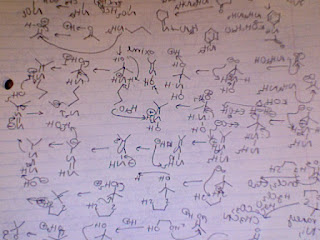AAAAAAAAGGGGGHHHH!!!!!!!!!!!
Just
kidding, it’s fine. We’re all fine. But let’s be honest, here in this complexly (and female) analytical mind of mine, it can all feel a little overwhelming. Let
me be your tour guide.
Over
here to your right is where I store everything I know about geography, history,
politics, where I put my belongings, and how to catch flying objects. Oh look,
a tumbleweed. Over to your left is my hippocampus, which seems to be eternally
under construction and watch your head!...
Phew, you almost got hit by a flying rogue Chemistry equation. But all is well;
up ahead you can see the door that leads to where I hold all my emotions, but
it’s kind of a neglected mess right now so we’ll save that for another day,
shall we? Right across the hall you’ll find a room filled with a giant netted
web… I like to call this the room of False Associations. Let’s camp out here
for a while.
Lately
I’ve been realizing that some of the schemas I’ve created for moral concepts
are a little sloppy. And I think these false understandings were much of the
cause of frustration and exhaustion in which I found myself entangled last
semester. To explain, here’s a little piece of my web:
Selfless
Acts à
Difficult and draining
Selfish
Acts à
Easy and help me to control my life
Easy
Things à
Save up energy to do more difficult things later
The
Most Difficult Thing à
The Right Thing
So
basically, all semester I’ve been thinking that if I do a whole bunch of easy,
selfish acts I can control my life and save up my energy to do all the good,
difficult, sacrificial things later. Right? Take care of me and then I can take
care of everyone else.
No!
This is bad advice!
First
off, taking care of myself is not truly taking care of myself if it neglects
Jesus, who is my identity. But more on that in a moment. Otherwise, selfless
acts often turn out to be simple, far-reaching, and enjoyable whereas selfish
acts turn out to be draining dead ends. Plus, doing easy things that I thought
I could handle did not give me any more energy to be selfless and heroic later,
they just cluttered my life with easy, controllable acts. I have also
discovered that sometimes the right thing to do is the thing I most want to do.
It might not always be easy, but at least it’s desirable!
But
ultimately, the unsatisfactions (that’s not a real word but whatever) and
falsities I find in life always have the same heart-issue root. Sometimes
irritatingly so. My overall joy in life is not resultant of my life situations—when
my life has looked objectively sad, I was not sad; when my life has looked
objectively fine, I was not fine.
So
what exactly is the affecting variable?
Over
break I realized something equal parts obvious and mind-blowing: joy is a fruit
of the Spirit. See, all my life I’ve been thinking that fruit is this product I
have to muster up with all my effort as some sort of certificate of
achievement, proving that I have the
Spirit living in me. The words of Christian speakers haunted me: "Do you see fruit in your life?" But all this mustering business has felt a little like spiritual constipation.
But
apple trees don’t have to freaking squeeze out apples!
They just poof!
have apples and it’s very, very natural. In fact, if apple trees started
running around panicking or twisting themselves into knots in order to produce
apples it would seem rather unnatural.
And so joy is just something we get to grow—naturally—when we are walking in
the Spirit.
How
wonderfully refreshing is that? When we spend time reading Jesus’ words and
reflecting on Him in our daily lives, the result is effortless joy! And I’m not
just telling you this because it’s a theological truth; it has been the story
of my life for the last three weeks. God has just plopped joy like dollops of
whipped cream into my life and I haven’t even done anything!
So
the only thing directly affecting my feelings about life is
how closely I’m walking with the Spirit. When I’m being honest with myself and
inviting Jesus in on it, I get joy. I get
energy to be selfless and I find my desires focused on noble things. When I spend my time punching holes in the Christian
faith, doubting God’s existence and character and capacity to make my life less
oblivious, I am drained of joy. I walk around bouncing between narcissism and
self-loathing and everything everything everything ever is turned in toward
myself. I did kind of have to take care of myself before I took care of others, but that involved giving up some of my time to hang out with Jesus.
So
Jesus, it turns out, is yet again the answer. Funny how that always seems to happen.
Thus,
I have constructed a new web:
Time
spent reading Scripture à
expanded energy and time
Knowing
how loved I am à the capacity to love out of pure overflow!
Prayer
à God’s desires become
mine
Walking
in the Spirit à
Joy and spiritual regularity
Let's stop trying to squeeze out fruit.
Let's stop trying to squeeze out fruit.

